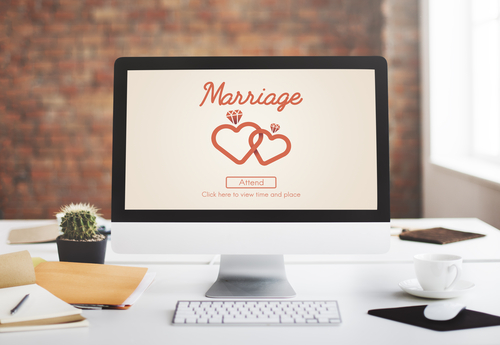SCOTUS should uphold long-standing precedent in case involving objection to same-sex marriage, ABA says

Image from Shutterstock.
The ABA is urging the U.S. Supreme Court to again reject arguments by private businesses that claim First Amendment exemptions from laws that prohibit discrimination in the provision of public accommodations.
“In this case, the court must decide whether it will once again reject those same arguments in situations involving the denial of public accommodations on the basis of sexual orientation,” said the ABA in an amicus brief filed Friday. “It should.”
“If, as Coloradans clearly intend, gay and lesbian people are to be equal citizens and not ‘social outcasts’ … it is imperative that this court reject petitioners’ request for a constitutional exemption, just as it did a half-century ago, when business owners sought similar exemptions from laws prohibiting race discrimination,” the ABA added.
The Supreme Court agreed in February to consider the case, which was brought by Lorie Smith, a web designer in Colorado who argues that she has a First Amendment right to refuse to provide services for same-sex weddings.
Smith, the owner of 303 Creative, plans to offer wedding website design services that promote her understanding of marriage as between a man and a woman, according to the cert petition that she filed in September 2021. She also wants to post an online statement explaining that she can only share messages that are consistent with her faith.
The 10th U.S. Circuit Court of Appeals at Denver ruled against Smith in July 2021, finding that a Colorado anti-discrimination law did not violate rights under the First Amendment when it required public accommodations to provide equal access to services, regardless of sexual orientation.
While the appeals court acknowledged that Smith’s websites are pure speech implicating her unique creative talents, it also noted that Colorado “has a compelling interest in protecting both the dignity interests of members of marginalized groups and their material interests in accessing the commercial marketplace.”
Alliance Defending Freedom represents Smith. The conservative Christian nonprofit group also represented Jack Phillips, who refused to bake a cake for a same-sex wedding. The Supreme Court ruled narrowly for Phillips in Masterpiece Cakeshop v. Colorado Civil Rights Commission in June 2018, holding that the Colorado Civil Rights Commission violated his rights by showing hostility to his religious explanation.
Smith said in her cert petition she “seeks only to speak ‘in a manner consistent with [her] religious beliefs; [she] does not seek to impose those beliefs on anyone else,’” and that the Supreme Court’s review is needed “to reaffirm that the government cannot compel artists to speak government-approved messages or enforce ‘content-based restriction[s]’ on speech designed to ‘excis[e] certain ideas or viewpoints from the public dialogue.’”
The ABA noted in its amicus brief that Title II of the Civil Rights Act of 1964 prohibits discrimination on the basis of race, religion or national origin in the provision of public accommodations. While business owners continued to challenge these laws based on their purported right to choose their customers, the Supreme Court and Congress repeatedly rejected conscience exemptions from federal anti-discrimination laws.
“Out of the Civil Rights Era, then, a ‘settled social consensus’ emerged that commercial businesses cannot claim constitutional cover from public accommodations laws,” the ABA said. “Petitioners’ effort to revive such constitutional arguments by recasting them as compelled-speech claims should not prevail in light of this court’s unbroken line of precedent refusing to recognize a business owner’s individual right to avoid compliance with a valid anti-discrimination law.”
The ABA also contended in its brief that if the Supreme Court affords First Amendment protections to Smith or other business owners who have religious objections to same-sex marriage, it “would provide carte blanche for commercial entities to deny gays and lesbians equal access to goods and services based on their own subjective view of the ‘message’ conveyed by providing their services.”
“Because many activities can be cast as expressive in nature, a conscience exemption could not be cabined to web designers,” the ABA continued in its brief. “Chefs, printers, florists, tailors, jewelers, barbers, bartenders and bakers could all refuse to provide wedding-related services to gays and lesbians on the grounds that their conscience precludes them from applying their skills to enhance the wedding celebration.”
The ABA has long advocated against discrimination based on sexual orientation, adopting a policy in 1973 that urged the repeal of laws that criminalized sexual relations between consenting adults. In 1989, the association adopted a policy that condemned discrimination based on sexual orientation in employment, housing and public accommodations; and in 2006, it adopted a similar policy that advocated against discrimination based on gender identity.
And in 2010, the ABA adopted a policy that called for the end of all legal barriers to same-sex marriage. The association has additionally filed amicus briefs in several Supreme Court cases that involve recognizing equal rights to gay and lesbian people.
Munger, Tolles & Olson filed the brief pro bono on behalf of the ABA. An Aug. 19 press release is here.
The case is 303 Creative v. Elenis. Oral arguments have not been scheduled.
Write a letter to the editor, share a story tip or update, or report an error.



